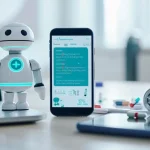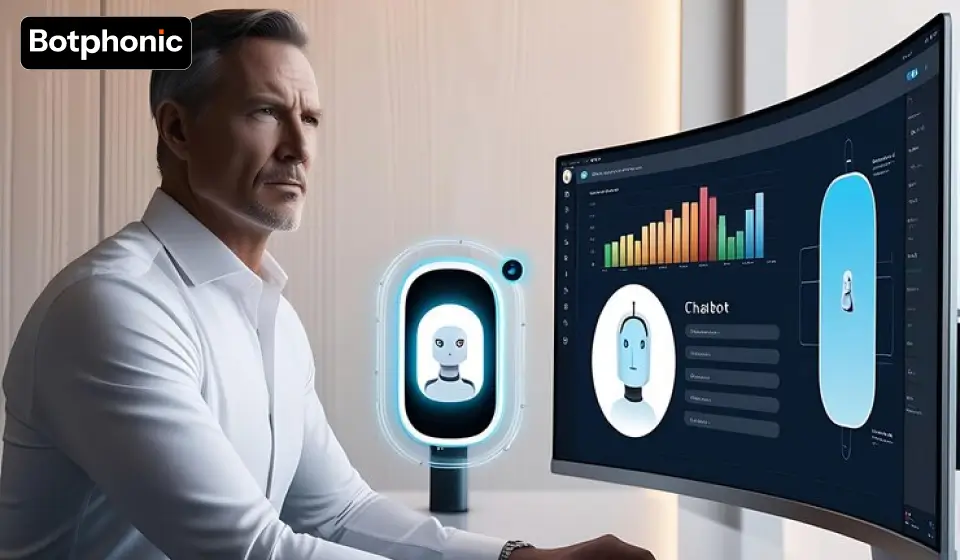
Summarize Content With:
Summary
AI voice assistant vs medical receptionist. Which is better?
Are you facing scenarios like missed calls, workload stress, and patients waiting? To overcome such circumstances, what should you choose??? AI voice assistants can automate tasks, but can a voice AI assistant understand the feelings of patients? How do you cope? In this blog, I will provide you with a detailed comparison of an AI voice assistant vs a medical receptionist. At the end, you will get a clear idea of which approach is better for your clinical sectors.
Introduction
It is an important decision for every business, especially a medical clinic, “whether to hire an AI voice assistant or a medical receptionist”.
As technology advances rapidly, in 2025, AI voice assistants are becoming smarter, while human touch remains highly valued in healthcare.
Managing hospitals is not an easy task, especially handling the front desk. Handling a huge volume of calls, appointment coordinates, and guiding patients is truly hectic work for the front desk.
These workloads slow down the clinic workflows: missed patient appointments, increased waiting time, and put stress on doctors and admin departments. These are the reasons why the clinic sectors are shifting to AI-powered voice assistants.
Consider a medical assistant who is always on call, provides accurate information to patients, and schedules appointments without any human interference. These smart solutions will keep your front desk active around the clock, without burnout.
AI Voice Assistant vs Medical Receptionist: Key Differences

The front desk is a crucial part of every clinic. Both options, a front desk receptionist at a clinic and a virtual medical assistant, are helpful for hospitals. Here, I will give a brief overview of virtual medical receptionists and AI voice assistants.
Virtual medical receptionist
Virtual medical receptionists are real humans who work remotely and handle tasks such as providing details to patients, fixing appointments, rescheduling, or any admin-related work. But virtual receptionists for medical practices are not a part of your clinics; they are third-party services, where they lack a personal touch.
AI Voice Assistant
In the past, you used to press buttons like pressing 1…pressing 2..but AI voice assistants are smart solutions that understand natural language processing, Automatic speech recognition, and behave like humans. Voice AI assistants can understand patients’ pain points, their health issues, behaviour, and respond to them accordingly.
AI voice assistants provide a personalized touch in every conversation and provide a natural experience to patients. Thus, it reduces the wait time, provides accurate information to patients, and initiates the treatment process in time without delay.
AI Voice Assistant vs Medical Receptionist: Benefits
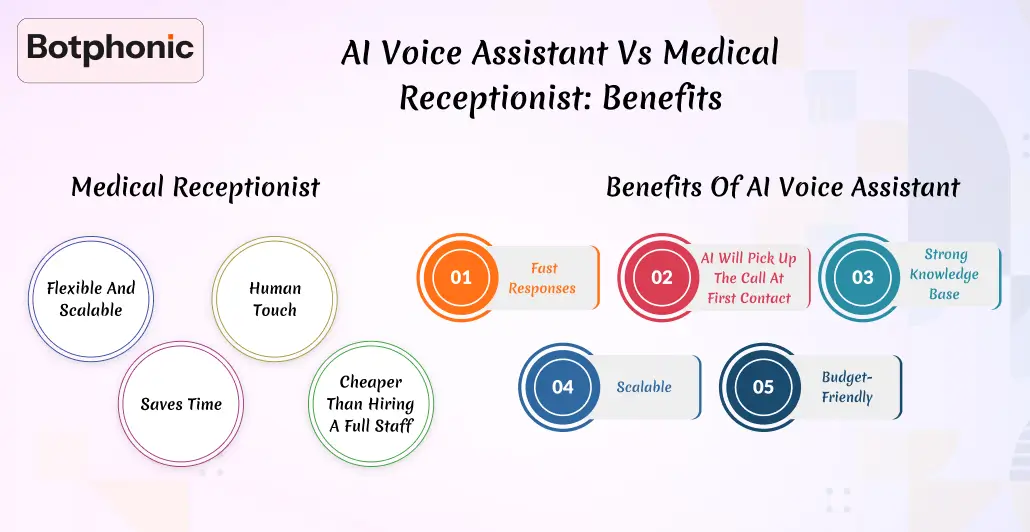
I hope you got a clear understanding of the AI voice assistant and virtual medical receptionist role. Next, I will talk about some benefits.
Medical Receptionist.
Let’s find out:
1. Flexible and scalable
If your clinic is busy?? No problem!! Virtual medical receptionists are active during peak hours, and you can scale the team as per your convenience.
2. Saves time
It is an important part of the admin department to handle and manage patient calls. But sometimes they missed it.
By outsourcing calls to a virtual medical receptionist, you can easily handle high call volume scenarios. In this way, your internal team can focus on other important tasks, such as patient care, and improve the productivity of the health sector.
3. Human touch
As we know, voice assistants are smart tools and can automate all your basic work, like patient call handling, scheduling meetings and appointments, and more, but a human touch is still important. Many patients feel comfortable when interacting with humans. Real voice, real emotions are crucial to build a strong rapport with patients.
4. Cheaper than hiring a full staff
On-site receptionists are costly; you need to pay a high salary. But virtual receptionists are operating remotely, and they provide budget-friendly solutions.
Benefits of AI Voice Assistant
Here I will discuss a few benefits of conversation AI voice assistant:
1. Fast responses
Voice assistants provide quick responses to patient queries. Voice assistants can easily handle patient calls, fix appointments, reschedule, check availability and cancel the appointment and send confirmation mail to patients, set a reminder, and much more.
2. AI will pick up the call at first contact
When your staff is busy or forgets to call back, patients wait for the receptionist to schedule the appointments. Further, 50% of people deduct calls after 90 sec as per research.
AI voice assistant receives every call instantly without delay and resolves the patient queries at first contact.
3. Strong Knowledge base
Botphonic, a smart AI call assistant, can easily fetch all the relevant data and information from your websites and applications and provide accurate answers to patients related to FAQ, timing, and services without any delay and confusion.
4. Scalable
If your clinic gets a huge volume of calls, you don’t need to hire additional staff. AI voice agents can handle high call volume scenarios and provide accurate responses to patients with clarity and same speed.
5. Budget-friendly
AI voice agents have fixed costs starting from $99 to $499, depending on your features and usage. It eliminates the cost of hiring human agents and providing training to them.
AI Voice Assistant vs Medical Receptionist: Cost Analysis
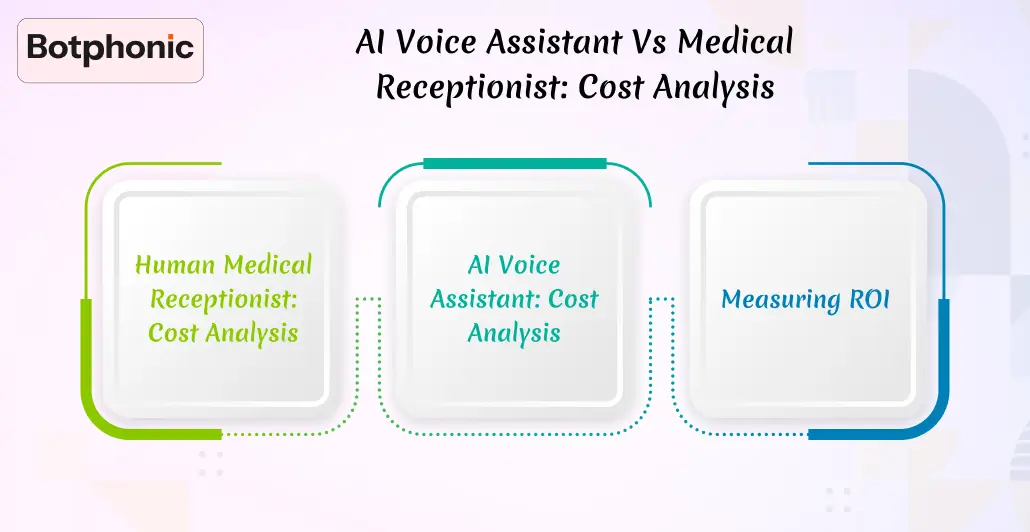
Every business is looking for budget-friendly strategies. When it comes to phone receptionists, there are two options available: AI voice assistants and Human medical receptionists. Let’s compare both.
1. Human Medical Receptionist: Cost Analysis.
A medical office virtual receptionist requires a fixed salary that varies from $25,000-$45,000 as per the current market in the USA. Along with that, you need to pay:
- A medical receptionist requires health insurance and paid time leaves as well, which enhances the basic salaries up to 20-30 %.
- Training costs, especially for onboarding staff.
- If the receptionist is on leave, then you have to pay for sick leave as well.
- Cost of office space, computer, and phones.
- Recruitment process
Overall, a medical receptionist’s charges are dynamic and unpredictable as well.
2.AI Voice Assistant: Cost Analysis.
AI voice assistant upfront cost is high, but in the long term, it simplifies the workload of clinics. AI voice agents require:
- Setup fees that vary from $500 to $5000 as per the complexity of your system.
- Monthly fees vary from $200 to $2000, depending on the features required.
- No need to pay payroll taxes, staff compensation, and overtime fees.
- No salary, paid leaves, sick leaves
- Budget-friendly, you only have to pay a fixed monthly cost.
Overall, AI voice agents are active 24/7, which is perfect for a busy medical receptionist where call volume is high.
3. Measuring ROI
If your medical practice involves high-volume call scenarios, then the return on investment of an AI voice assistant is better. How??
- Whenever you scale the system, AI voice assistance costs are predictable.
- Break even point occurs in 12 to 18 months.
- Human medical receptionist costs increase with scalability.
- Costs get high on hiring a new team, training, and office space.
If you are considering replacing a medical receptionist with AI voice assistance, from a financial angle, AI will be your smart choice, especially for the long term. But you still need a human medical receptionist for handling complex tasks.
Handling basic tasks such as appointment scheduling, call handling, and providing important information to patients can be easily handled by AI. I will suggest going for a hybrid approach, hiring a medical receptionist for handling complex tasks, and deploying an AI voice assistant for handling basic tasks. In this way, you can reduce workloads on the receptionist and provide quality care and support to patients.
AI Voice Assistant vs Medical Receptionist: Customer Experience Consideration.
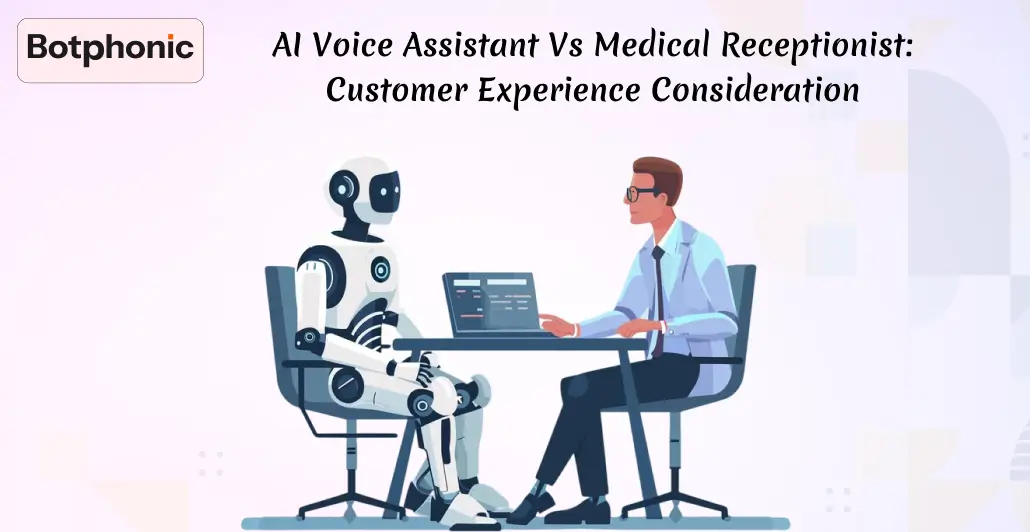
Every patient expectation is different. Patient needs vary with age, situation, and experience. When it comes to interaction with a medical receptionist or AI voice agents, the patient choice is completely context based.
Younger and older patients both have different preferences. Let’s find out:
Younger patients are especially tech-savvy. They prefer speed, efficiency, fast response, and minimal waiting time in the system. Old patients, on the other hand, often feel comfortable when they interact with a human medical receptionist, this boosts trust and warmth in them.
Now let’s check what AI voice agents can provide to boost customer experience:
- Multilingual support that eliminates the bottleneck of language barriers.
- Wait time is either zero or minimal, so it is a perfect solution for busy clinics.
- AI voice agents provide accurate and consistent information to patients without delay.
- AI agents never get tired, impatience, and always stay calm no matter what the situation is.
All these features are relevant as per use cases, especially when most of the patient calls are related to appointment handling, booking, cancellation, and FAQ.
Now let’s check what a Human medical assistant can provide to boost customer experience:
- Empathy or emotional intelligence that AI voice assistants can’t replicate.
- When patients are emotionally stressed during medical illness and emergencies, one human touch makes a huge difference.
- Human medical receptionists can offer personal attention, they can easily remember patients’ names and their preferences.
So, what works best?
AI voice works best when you need to handle high-volume call scenarios such as booking, confirmation, reminders, and more. It reduces the manual workload and minimizes errors and missed appointments. A human medical receptionist works wonders when you need to handle complex scenarios, trust-building, and emotional connection.
Best approach? Choose a hybrid approach, where AI agents can handle basic tasks and a medical receptionist can handle complex scenarios where human touch is still required.
Conclusion
It is crucial to consider the size of your business when choosing receptionist solutions for your clinic. Small clinics can save their budget by deploying AI voice assistants; on the other hand, big healthcare sectors require human medical receptionists for handling complex tasks and building strong connections with patients. However, medium sized clinicians often rely on hybrid approaches, AI for handling basic tasks and human medical receptionists for handling complex works.
The healthcare business should consider patient age group, industry type, service complexity, and budget before embarking on this journey. Before taking the final decision, it is important to take a trial.
Still having doubts? Connect with Botphonic and book a free demo session.
